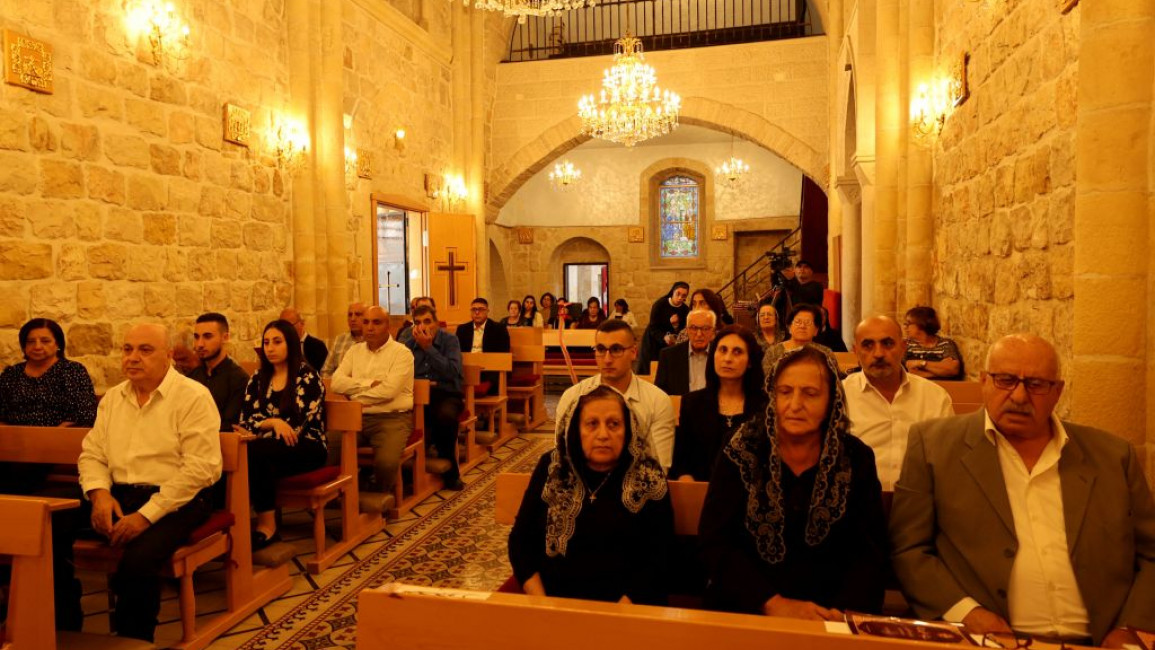Gaza's Christians hold 'baptism under fire' with fears Palestinian children will not survive Israel's onslaught
A collective baptism has been organised for newborn babies in the besieged Gaza Strip this week, driven by a fear for Christian Palestinian families that their children may not survive Israel's relentless bombardment that began on 7 October.
Families, who took refuge in two churches in Gaza, want to make sure their children are baptised before they die, according to Evangelical Lutheran pastor Munther Isaac.
The pastor, based in the West Bank, said that the move was a sign of accepting "inevitable death" as a result of Israel's brutal onslaught, which has so far killed over 8,500 Palestinians, including over 3,500 children.
The New Arab spoke with a Palestinian Christian father, who used the pseudonym Fadi to protect his identity, and whose daughter was baptised in a collective ceremony.
"We initially came to the church because we thought that dying with people who are close to us is a form of mercy. We were asked to leave to the south, but we are a small community of 900 people, and we don’t know where to go in the south," he told The New Arab.
Christians in the Gaza Strip who have taken refuge in two churches are conducting collective baptisms of unbaptized babies in case their children are killed during Israeli bombing.
— Sprinter (@Sprinter99800) October 28, 2023
Parents want to be sure their children are baptized, said Evangelical Lutheran pastor Munter Isaac… pic.twitter.com/DQGVxPYVIM
The Christian population in Gaza has declined significantly over the years. In 2007, there were around 7,000 Palestinian Christians, but following a mass exodus amid a brutal Israeli siege, less than 1,000 now remain.
On 20 October, an Israeli strike on the compound of the Orthodox Church of Saint Porphyrius killed at least 18 Palestinian civilians sheltering inside it, wounding dozens more.
Before it was bombed, churches were perceived as safe shelters for the community. Fadi describes how most Christians in Gaza prefer to "stay away from politics", and the latest church bombing had come as a shock to everyone.
"We used to feel safe inside the church. We thought that we were safe. It still feels like a nightmare," he said.
Fadi witnessed the bombing of the Orthodox Church of Saint Porphyrius. He said that the Israeli strike was near the fence of the church and damaged the compound's scout building, which was used as a shelter by 100 people – 17 of whom died, mostly women and children.
"I think it'll only be after the war, I mean, if we're still alive, that we'll feel the pain of this. We'll then begin to realise who died, what it was like to pull out dead bodies of loved ones from under the rubble, and how it felt to make lists of all our names so that we know who died by crossing out their names when we can’t find them among those who survived," he said.
Fadi spoke to TNA from the Church of Saint Porphyrius, saying that the majority of Christians in Gaza had taken the Orthodox church to be a shelter, but after the recent attack on it, many had fled in desperate search of a safer refuge.
Collective baptism
Four of the children who died in the strike on the church had not been baptised because they were only a few days old, Fadi said, saying that one is only considered a Christian after being baptised.
He said families wanted their children to "meet God" as Christians.
"After four children died before they were baptised, the priest had the idea and suggested to the families with newborns to have a collective baptism for the nine babies. My daughter was one of them," he said.
Fadi compared the collective baptism to a normal ceremony, which involves extending invitations to the community.
"There was a bittersweet joy to it. We disconnected from the external situation for a moment and congratulated each other. It was unique and strange," he said.
When asked whether belonging to a minority group in Gaza was struggle, Fadi said: "The only problem now is the war... we have no problem inside the strip as a minority".
"We are one community, we're living in the same place, sleeping in the same place, and our main problem is how to save our resources to survive the blockade that is leaving us deprived of food, water and electricity," Fadi said.
"If there's any means to pressure decision-makers to end the bombing, once and for all, then that would be the biggest favour the international community can do for the Christian and Muslim community in Gaza alike."



